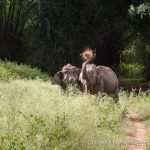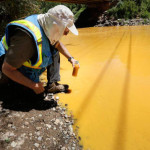Obituary: Professor Ratan Lal Brahmachary (1932-2018)
By Shubhobroto Ghosh
Professor Ratan Lal Brahmachary, distinguished biochemist and a pioneer of tiger pheromone studies in India, died in the early hours of the morning of 13 February 2018 in a nursing home in Kolkata, India. He was 86 years old.

Ratan Lal Brahmachary by Shubhobroto Ghosh
Born in Dhaka in Bangladesh in 1932, Ratan Lal Brahmachary was enamoured with wild life and adventure in African jungle since his childhood. He was an astrophysicist by training and a student of eminent Indian theoretical physicist, Satyendra Nath Bose. His studies were undertaken at Calcutta, Dhaka and Hamburg. Brahmachary shifted streams from astrophysics to study pheromones at the Indian Statistical Institute under its founder Prasanta Chandra Mahalanobish when fields of studies were being broadened at Indian Statistical Institute. He studied many species of wildlife, notably big cats, and undertook research trips to his favourite continent Africa fourteen times. He joined Indian Statistical Institute in 1957 and conducted extensive research in Marine Biological Laboratories in Italy, France and other institutes in Europe. He retired as professor and head of the department of embryology at Indian Statistical Institute in Kolkata in 1992.
An ardent admirer of entomologist Gopal Chandra Bhattacharya, Brahmachary studied ethology in the Amazon basin in South America and Borneo, Indonesia. He was among the first scientists to observe the scent-marking behaviour of tigers, where the animals spray urine on tree branches to mark their territories and communicate via biochemical messengers. Synthesising the chemical nature of tiger urine (marking fluid), Brahmachary, alongwith Jyotirmoy Dutta of Bose Institute, Kolkata and Moushumi Poddar Sarkar of the Botany Department of Calcutta University made the first comprehensive approach towards understanding the nature of big cat pheromones.
Brahmachary’s research found out that the molecule 2 acetyl-1-pyrroline (2AP) was present in tiger urine (marking fluid) and was the very same molecule that imparts the beautiful aroma to fragrant varieties of rice like basmati.
The biochemist was assisted in his studies on tiger pheromones by former Prime Minister of India, Indira Gandhi, who supported his scientific investigations. When Brahmachary was looking for a tiger cub to study pheromonal communication in 1981, Gandhi famously responded, “So you want a tiger cub?”, and later facilitated his research on tigers, both in captivity and in the wild. An inveterate traveler, Brahmachary forged celebrated friendships with conservationists and animal welfare professionals from across the world.
He wrote several books in Bangla to promote the cause of wildlife protection and scientific observation of animal behaviour, including ‘Africar Jongoley Barobar’(‘Twelve Visits to the African Jungle’) and ‘Bagh, Shingha, Haathi (‘Tiger, Lion and Elephant’), receiving the coveted state prize of Bengal, the Rabindra Puraskar, for his contributions to science popularisation. His academic book ‘Animal Behaviour’ is among the few books on the subject written by an Indian scholar. His other books include, ‘Abar Africar Jongoley’, ‘Shingher Deshey’ and ‘Bagh O Tar Gyati Goshthi’. His life’s work with big cats was summarized for a popular audience in the book, ‘My Tryst With Big Cats.’
A founder patron of Zoo Check, now the Born Free Foundation, Professor Brahmachary always emphasised that wildlife belongs in the wild and strongly stood for compassionate treatment of animals in research. “Biology is as fascinating as probing the mysteries of the physical universe. The inner universe of an organism or of an ecosystem is as challenging as the outer Universe of the expanding cosmos,” he once said in an interview.
A life-long bachelor, Brahmachary had pledged his body to medical research. After his students and colleagues paid their last respects to him at the Indian Statistical Institute in Kolkata, his body was handed over to the Radha Govinda Kar Hospital authorities.
Professor Ratan Lal Brahmachary was mourned by wildlife lovers across the world who paid fulsome tributes to his life and legacy.
Dr K R Parthasarathy, professor emeritus at Indian Statistical Institute and a former colleague of Professor Brahmachary reminisced : “During the period when we were research scholars in the Research and Training School of Indian Statistical Institute, Ratan Lal Brahmachary was our most sparkling companion who shared many a scientific thought in physics, biology and linguistics with statistics as a unifying thread passing through them all. With just one big boiled potato with salt on his table for lunch, drinking gallons of water he could lecture to us for hours every week. We could give him in return only the abstract beauty hidden in the symbols of mathematics. Starting with physics in the beginning of his career he turned into an experimental biologist interested deeply in animal behaviour. At ISI he was a unique star symbolizing Professor Mahalanobis’ dream, “Bhinneshu eikyasya darshanam”(vision of unity in diversity). I offer my heartfelt prayers to God with deep respects to the great departed soul.”
In April, 2017, Professor Ratan Lal Brahmachary was part of a delegation at the Indian Statistical Institute in Kolkata that hosted Mrs Lee Durrell, Honorary Director of the Durrell Wildlife Conservation Trust. Recalled Mrs Durrell : “I do recall meeting him at the ISI – a splendid fellow. I offer my condolences to his family.”
Lion researcher Gareth Patterson, who is considered to be George Adamson’s protégé, an author and maker of films had spent time with Ratan Lal Brahmachary at Kampi Ya Simba at Kora National Park in Kenya. Learning of his death, Gareth wrote : “He was a really great man. I was very privileged to have spent time with him, and learnt much from him, at George Adamson’s camp in the Kora National Park, Kenya. ”
Professor Brahmachary was a founder patron of Zoo Check(now the Born Free Foundation) since 1984, an organization that questions the traditional zoo concept and campaigns to keep wildlife in the wild. The founders of Born Free Foundation, Will Travers and Virginia McKenna sent out a message of condolence that reads as follows : “Professor Brahmachary corresponded with Bill Travers and Virginia McKenna, our founders, for over 30 years and met with them on several occasions.
Virginia McKenna recalls: “It was a very sad moment when I learned of Professor Brahmachary’s death. His life was linked to ours in several unusual ways – as one of Zoo Check’s first Patrons in the 1980s, and also because of his work with our close friend, George Adamson, in Kenya’s Kora Game Reserve (now Kora National Park). Two very different, extraordinary men bound by their compassion and concern for wild creatures and their belief that they should never be in captivity.”

Ratan Lal Brahmachary with George Adamson
Professor Brahmachary was widely-regarded as a man of wisdom and understanding. He was deeply concerned about the suffering of wild animals in captivity and was always keen to promote a compassionate conservation agenda which aimed to reconcile the needs of free-living wild tigers and the human communities that lived nearby.
Virginia concluded: “One thing I recall, as if it was yesterday. The Professor and I had lunch together at the Chelsea Arts Club, in the heart of London, but our souls were in Africa – sharing our thoughts, feelings and memories. We, and the animals, have lost a loyal and true friend.”
Will Travers
President, Born Free Foundation”
I personally feel a deep sense of loss at Professor Ratan Lal Brahmachary no longer being around. Professor Ratan Lal Brahmachary introduced my work to the Indian Statistical Institute where I could show the film, ‘Zoochosis’ on zoo animal behaviour in 2015. I read all his books and had immense respect for his intellect and his compassion for captive zoo animals as the founder patron of Zoo Check. His exactitude is measured by the fact that he would tell me, “Tumi koyek seconder jonyo opekkha koro”(Please wait for a few seconds) during an interruption whilst speaking on the phone. An ethologist par excellence, in the tradition of Gopal Chandra Bhattacharya and Jagadish Chandra Bose, Professor Brahmachary was a towering figure in the field of science, conservation and animal welfare. The summary of his life’s work on tiger pheromones was published in a book named ‘The Neurobiology of Chemical Communication’ edited by Carla Mucignat Caretta in 2014. His work has also been covered by Adrian House in his dual biography of Joy and George Adamson, named ‘The Great Safari’ and former Indian environment minister, Jairam Ramesh’s biography of Indira Gandhi, ‘Indira Gandhi : A Life In Nature’ published in 2017. I personally got to know him only during the last years of his life but I will miss him forever. Go well, Sir, With love.
An interview with Professor Ratan Lal Brahmachary was published earlier in an issue of IndiaWilds newsletter, Volume VII, Issue I, 27 January, 2015.
- Obituary: Professor Ratan Lal Brahmachary - 26 February,2018










